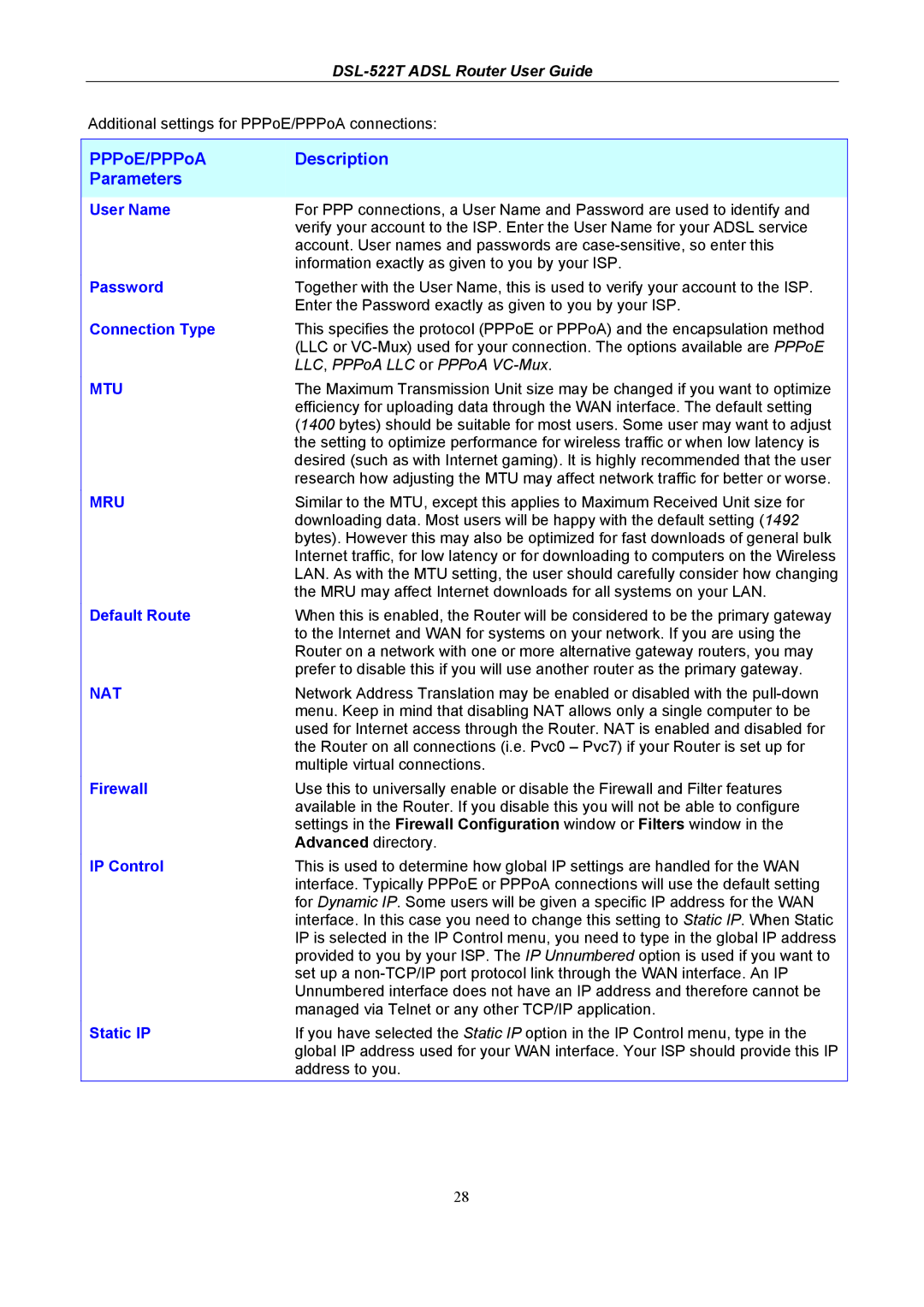DSL-522T ADSL Router User Guide
Additional settings for PPPoE/PPPoA connections:
PPPoE/PPPoA | Description |
Parameters |
|
|
|
User Name | For PPP connections, a User Name and Password are used to identify and |
| verify your account to the ISP. Enter the User Name for your ADSL service |
| account. User names and passwords are |
| information exactly as given to you by your ISP. |
Password | Together with the User Name, this is used to verify your account to the ISP. |
| Enter the Password exactly as given to you by your ISP. |
Connection Type | This specifies the protocol (PPPoE or PPPoA) and the encapsulation method |
| (LLC or |
| LLC, PPPoA LLC or PPPoA |
MTU | The Maximum Transmission Unit size may be changed if you want to optimize |
| efficiency for uploading data through the WAN interface. The default setting |
| (1400 bytes) should be suitable for most users. Some user may want to adjust |
| the setting to optimize performance for wireless traffic or when low latency is |
| desired (such as with Internet gaming). It is highly recommended that the user |
| research how adjusting the MTU may affect network traffic for better or worse. |
MRU | Similar to the MTU, except this applies to Maximum Received Unit size for |
| downloading data. Most users will be happy with the default setting (1492 |
| bytes). However this may also be optimized for fast downloads of general bulk |
| Internet traffic, for low latency or for downloading to computers on the Wireless |
| LAN. As with the MTU setting, the user should carefully consider how changing |
| the MRU may affect Internet downloads for all systems on your LAN. |
Default Route | When this is enabled, the Router will be considered to be the primary gateway |
| to the Internet and WAN for systems on your network. If you are using the |
| Router on a network with one or more alternative gateway routers, you may |
| prefer to disable this if you will use another router as the primary gateway. |
NAT | Network Address Translation may be enabled or disabled with the |
| menu. Keep in mind that disabling NAT allows only a single computer to be |
| used for Internet access through the Router. NAT is enabled and disabled for |
| the Router on all connections (i.e. Pvc0 – Pvc7) if your Router is set up for |
| multiple virtual connections. |
Firewall | Use this to universally enable or disable the Firewall and Filter features |
| available in the Router. If you disable this you will not be able to configure |
| settings in the Firewall Configuration window or Filters window in the |
| Advanced directory. |
IP Control | This is used to determine how global IP settings are handled for the WAN |
| interface. Typically PPPoE or PPPoA connections will use the default setting |
| for Dynamic IP. Some users will be given a specific IP address for the WAN |
| interface. In this case you need to change this setting to Static IP. When Static |
| IP is selected in the IP Control menu, you need to type in the global IP address |
| provided to you by your ISP. The IP Unnumbered option is used if you want to |
| set up a |
| Unnumbered interface does not have an IP address and therefore cannot be |
| managed via Telnet or any other TCP/IP application. |
Static IP | If you have selected the Static IP option in the IP Control menu, type in the |
| global IP address used for your WAN interface. Your ISP should provide this IP |
| address to you. |
28
